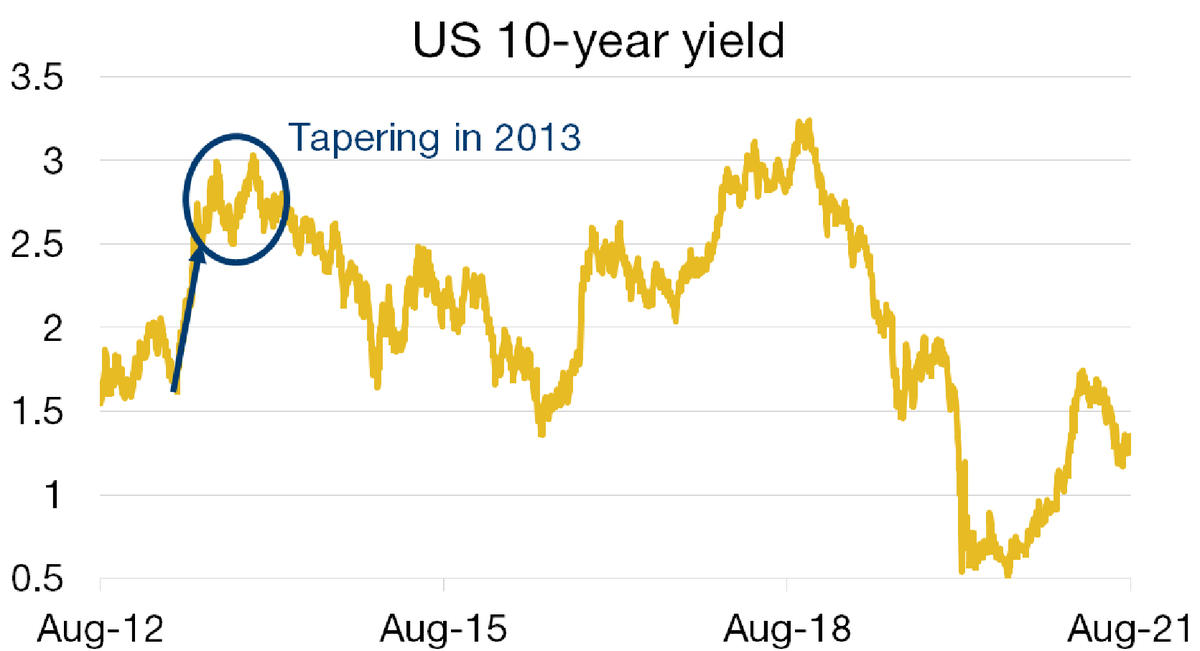30/08/2021
Flash boursier
Key data
| USD/CHF | EUR/CHF | SMI | EURO STOXX 50 | DAX 30 | CAC 40 | FTSE 100 | S&P 500 | NASDAQ | NIKKEI | MSCI Emerging Markets | |
| Latest | 0.91 | 1.07 | 12'439.00 | 4'190.98 | 15'851.75 | 6'681.92 | 7'148.01 | 4'509.37 | 15'129.50 | 27'641.14 | 1'272.67 |
| Trend | |||||||||||
| YTD | 2.92% | -0.61% | 16.21% | 17.97% | 15.55% | 20.36% | 10.64% | 20.06% | 17.39% | 0.72% | -1.44% |
(values from the Friday preceding publication)
Plenty of food for thought
Over the past week, financial markets had to crunch numbers relating to the progressing delta variant and come to terms with increased global political risks linked to the Afghan crisis. But mostly investors were awaiting the speech by Fed boss Jerome Powell at the annual Jackson Hole symposium (which took place over the internet). Their major concern – amid the lofty equity valuations – was the future of central banks’ monetary stimulus plans. In the end, investors responded positively and the main stockmarket indices are ending August with gains, in a month characterised by a much lower trading volume than usual. The S&P 500 is up 1.5%, long-term yields are down moderately and the dollar has lost ground, all after Powell’s tone was widely interpreted as dovish. Gold was up by only 0.6% over the week, showing that investors are still firmly ‘risk on’.
Powell’s speech on Friday, entitled Monetary Policy in the Time of COVID, highlighted that the US economy had made substantial progress towards the FOMC’s monetary policy objectives. That means that ‘tapering’ of the Fed’s purchases of bond and mortgage-backed assets (currently USD 120 billion per month) could happen as early as H2 2021, if the economy evolves as expected. However, no date was not revealed. Investors were merely told that the move could be delayed by risks arising from the rapidly spreading delta variant. It became clear that tightening monetary policy immediately could throw a spanner in the works. It was also stated that no automatic link existed between tapering and increased short-term interest rates. So there is no urgency to raise them, it was said. Reassuring news indeed.
The August jobs report, out this Friday, is expected to show another strong month, with 700,000 jobs creations forecast. Yet in July, there were still 8.7 million unemployed in the US, of which 2.9 million were classified as de facto ‘permanent losers’. It is amongst these disadvantaged workers that the Fed wants to see some improvement before it halts asset purchases and raises short-term interest rates. It is therefore by no means certain that the Fed will announce tapering at its meeting on 20-21 September.
US GDP growth for the second quarter of 2021 is estimated at an annualised 6.6%. The reopening of the economy, driven by vaccination and billions of dollars handed out to households, has stimulated consumer spending. As a result, GDP has reverted to its pre-pandemic level. However, indicators from July point to a slowdown, as the rise in the delta variant has dampened confidence. The recovery in Covid-sensitive activities has ground to a standstill, as has credit-card spending. The drop in the expectations component of the confidence index suggests lower consumer spending and could pin down GDP growth in the third quarter.
To taper or not to taper...
Asset-purchasing blitzes and zero interest rates were first used in response to the 2008 financial crisis. In 2013, the Fed moved to tighten its loose policy by slowing the pace of bond buying. Subsequently, 10-year yields rose sharply upwards of 3%. Inflation expectations – at the time 2.5% – fell back to 2%, while higher real rates triggered a downswing in the price of gold. The data then were similar to today. The 10-year US Treasury is yielding around 1.5%, and inflation expectations are hovering at 2.5%, which correspondingly has the markets worried about a possible rate hike.
However, now and then are like chalk and cheese. The upturn in long-term yields in 2013 triggered wider spreads, which was positive for equity markets. The tapering therefore only negatively impacted bond markets, while equities continued to rise amid low volatility. Today, however, we are seeing a narrowing of spreads and real long-term rates are falling. This is because lofty valuations would prevent equities from absorbing a rise in interest rates. From the perspective of the US budget deficit, the picture is also different. In 2013, the deficit was 4% of GDP, whereas today it is over 12%. As such, if the Fed were to raise rates too quickly, it would add to the US debt pile. Therefore, tapering will trigger substantially more volatility across all asset classes compared with 2013. One may rightly wonder if monetary policy should be tightened so soon. All indications suggest that the Fed will taper gradually as it will not want to influence long-term rates or cause a negative downswing common to more than one asset class.


 Flash boursier
Flash boursier
